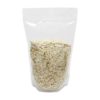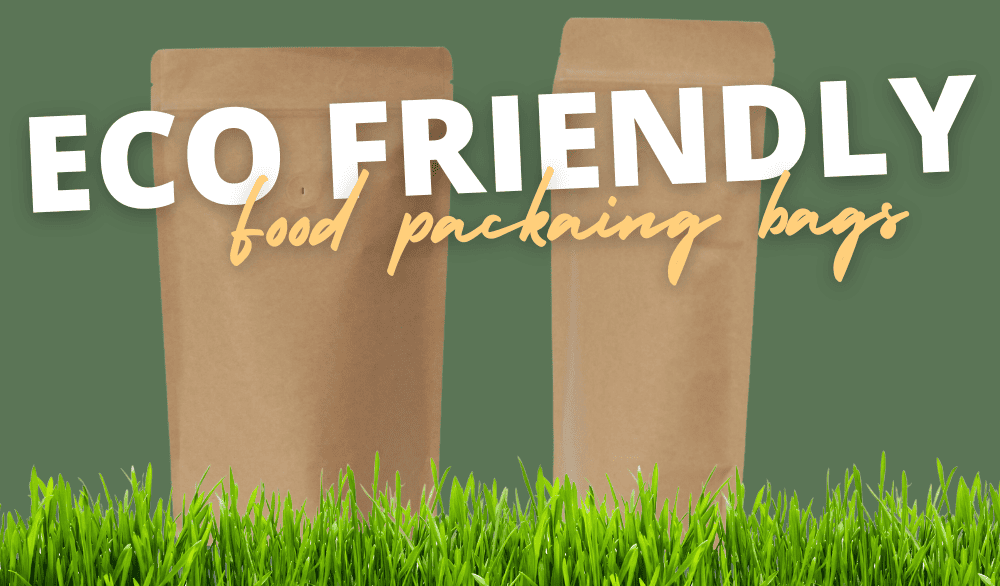Blog
The Eco-Friendly Revolution: Sustainable Food Packaging Bags
In recent years, a growing consciousness about environmental sustainability has led to a significant shift in consumer preferences. As more people become aware of the impact of their choices on the environment, there has been a surge in the demand for eco-friendly solutions across various industries. In the world of packaging, sustainable food bags have emerged as a prominent choice. This blog post delves into the burgeoning trend of eco-friendly food packaging bags, exploring various sustainable materials like biodegradable, compostable, and recyclable options. We will highlight the environmental benefits and consumer preferences that drive the adoption of these eco-conscious choices.
The Need for Eco-Friendly Food Packaging Bags
Traditional plastic packaging has long been the norm in the food industry due to its convenience and cost-effectiveness. However, the consequences of plastic waste on the environment are well-documented, from polluting oceans to endangering wildlife. The urgent need to address these issues has given rise to a wave of innovative, eco-friendly food packaging alternatives.
Sustainable Food Bags: An Overview
Sustainable food bags, also known as eco-friendly packaging, are designed to minimize their environmental impact. They prioritize the use of materials that are either biodegradable, compostable, or recyclable, reducing the burden of waste on the planet. Let’s explore each of these options in more detail:
Biodegradable Food Bags
Biodegradable food bags are made from materials that can break down naturally into non-toxic components over time. One of the most commonly used materials for biodegradable bags is cornstarch, which decomposes quickly and poses minimal harm to the environment. These bags are an excellent choice for single-use applications such as takeaway packaging or disposable cutlery.
The advantages of biodegradable food bags include reduced plastic consumption, reduced landfill waste, and a lower carbon footprint. However, it’s important to note that biodegradable bags still require specific conditions to decompose, such as the presence of microbes, oxygen, and adequate moisture. Therefore, they may not provide a perfect solution for all scenarios.
Compostable Food Bags
Compostable food bags take eco-friendliness to the next level. These bags are made from organic materials that can decompose into nutrient-rich soil when placed in a composting environment. Common materials used for compostable bags include plant-based plastics, sugarcane, and bamboo.
The advantages of compostable food bags are numerous. They significantly reduce the generation of landfill waste, support soil enrichment, and help close the loop on the food production cycle. They are an ideal choice for businesses and consumers who prioritize a zero-waste lifestyle and want to actively contribute to reducing their environmental footprint.
Recyclable Food Bags
Recyclable food bags are designed for repeated use, emphasizing the importance of the circular economy. These bags are typically made from materials like paper, cardboard, or various types of plastic that can be processed and reused. Recycling reduces the demand for new resources, conserving energy and reducing pollution.
Recyclable food bags offer the advantage of convenience and versatility. They can be used for a variety of purposes and are an excellent choice for those who are looking for a sustainable option that balances functionality and environmental impact.
Environmental Benefits of Eco-Friendly Food Packaging Bags
The adoption of eco-friendly food packaging bags offers numerous environmental benefits, which contribute to a healthier planet. Here are some of the key advantages:
Reduced Plastic Pollution
Traditional plastic packaging often ends up in landfills, water bodies, or as litter on the streets, causing severe pollution. Eco-friendly bags help mitigate this issue by utilizing materials that are biodegradable, compostable, or recyclable, thus reducing the accumulation of plastic waste in the environment.
Lower Carbon Footprint
The production of traditional plastic bags is energy-intensive and contributes to greenhouse gas emissions. In contrast, sustainable food bags made from materials like plant-based plastics, bamboo, or paper have a significantly lower carbon footprint. By choosing eco-friendly options, we can reduce our carbon emissions and combat climate change.
Conservation of Resources
The production of eco-friendly food packaging bags often relies on renewable resources such as cornstarch, sugarcane, or bamboo. This approach helps preserve non-renewable resources and reduces the environmental impact associated with their extraction and processing.
Soil Enrichment
Compostable food bags contribute to soil enrichment when they break down in a composting environment. The nutrient-rich soil produced can be used to grow more food, completing a sustainable cycle. This not only reduces waste but also supports local agriculture and reduces the need for synthetic fertilizers.
Consumer Preferences for Eco-Friendly Packaging
The shift towards eco-friendly food packaging bags is not solely driven by environmental concerns. Consumer preferences also play a significant role in this transition. Here are some factors that contribute to the growing demand for sustainable packaging:
Environmental Awareness
Consumers are increasingly educated about environmental issues and are seeking ways to make eco-conscious choices. As a result, they are actively seeking out products and services that align with their values, including sustainable food packaging.
Health and Safety
Many traditional plastic food packaging materials have come under scrutiny due to concerns about potential health risks from chemicals leaching into food. Eco-friendly packaging made from organic materials often provides a safer and healthier alternative.
Brand Image
Businesses that adopt eco-friendly packaging can improve their brand image and reputation. Customers tend to favor companies that demonstrate a commitment to sustainability and responsible environmental practices.
Legal Requirements
In some regions, there are regulations in place that encourage or require businesses to adopt eco-friendly packaging. Complying with these regulations is essential for businesses looking to avoid fines and legal repercussions.
Corporate Responsibility
Many large corporations and small businesses alike are making sustainability a central part of their corporate responsibility and long-term goals. This commitment often extends to their choice of packaging materials.
Final thoughts
The rise of eco-friendly food packaging bags reflects a broader shift towards sustainability and environmental consciousness. Biodegradable, compostable, and recyclable options offer a wide range of choices to meet the diverse needs of businesses and consumers. The environmental benefits of reduced plastic pollution, a lower carbon footprint, and soil enrichment are driving the adoption of these eco-conscious solutions. Additionally, consumer preferences for environmentally friendly products are pushing businesses to embrace sustainable food packaging as a strategic choice.
As the world continues to grapple with environmental challenges, sustainable food packaging is not just a trend but a necessity. By making informed choices and embracing eco-friendly packaging options, we can contribute to a healthier planet and a brighter future for generations to come. Sustainable food bags are not only a smart choice for businesses but also an empowering choice for consumers who wish to make a positive impact on the environment.
Incorporating sustainable food bags into our daily lives is a small change that can lead to a significant difference. As we move forward, let us be mindful of the choices we make and support the green revolution by embracing eco-friendly food packaging bags. Together, we can reduce plastic pollution, lower our carbon footprint, conserve resources, and support a sustainable, circular economy. It’s time to make a lasting change and opt for a greener, more eco-conscious future.





